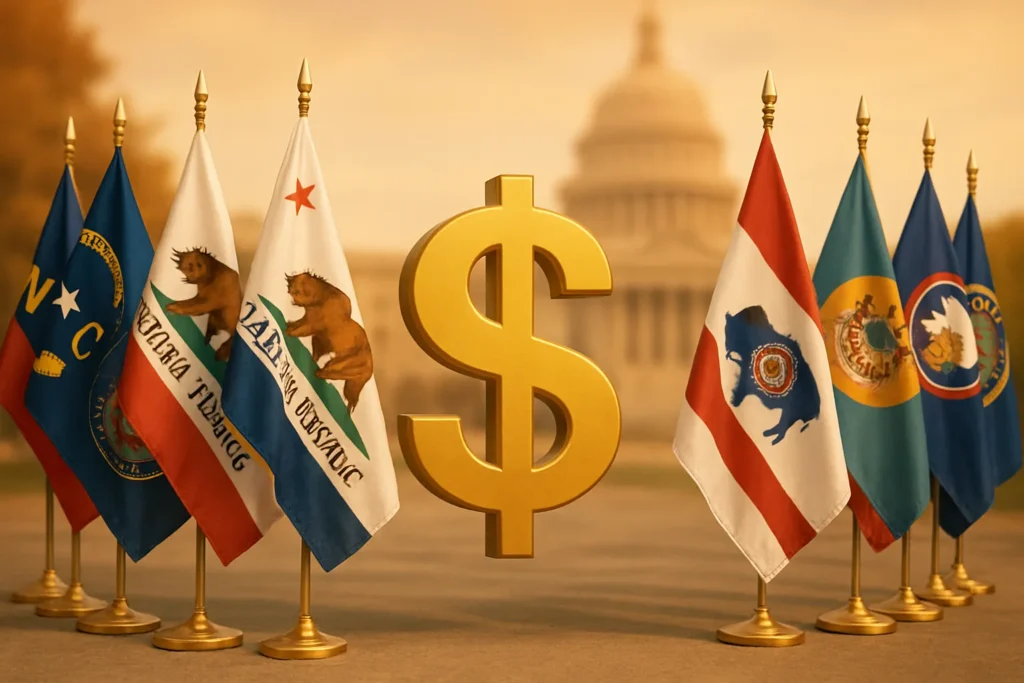The Federal Funds Standoff: States Draw a Constitutional Line
A quiet crisis is unfolding in statehouses across the country, one that could upend the very fabric of federal-state cooperation. This week, a coalition of twenty Democratic attorneys general from California to Rhode Island took the unprecedented step of filing two federal lawsuits against the Trump administration, charging that billions in disaster relief and transportation funding are being dangled as bargaining chips to force states into assisting federal immigration enforcement. If you’re wondering just how high the stakes are, consider this: Washington state alone risks losing more than $1.5 billion in annual federal support, emergency money crucial for everything from wildfire management to bridge repairs.
At issue are new directives from the Department of Homeland Security (DHS), led by Kristi Noem, and the Department of Transportation (DOT), under Sean Duffy. According to the lawsuits, these agencies are attaching unwanted strings to federal grants, demanding that states provide local law enforcement support for federal immigration activities—or risk having their funding frozen or retracted. States like New Jersey, still reeling from the aftermath of Superstorm Sandy, depend on these federal dollars for urgent infrastructure upgrades and disaster resilience.
Democratic leaders say these conditions are not only coercive, but unconstitutional. As Nevada Attorney General Aaron Ford put it, “This is about federal agencies reaching beyond their legal authority—all while communities face real threats from storms, wildfires, and aging highways.” The lawsuits rely on the Spending Clause of the U.S. Constitution, which places federal appropriations in the hands of Congress, not the White House. The attorneys general argue that forcing states to accept these last-minute immigration mandates is a flagrant violation of that principle—a view reinforced by recent Supreme Court decisions limiting executive overreach in spending powers.
Public Safety at Risk: The Damaging Reality Behind Withheld Funds
A closer look reveals that the Trump administration’s policy threatens not just legal precedent, but also public well-being. FEMA’s 2025 disaster-relief agreements inserted so-called “Civil Immigration Conditions” that tie massive emergency preparedness grants to state cooperation with federal immigration officers. The implications for states like Washington are stark. Reject the condition, and communities could face “out-of-control wildfires and impassable roads”, as the funds for prevention and recovery are cut off.
Maryland Attorney General Anthony Brown was blunt about what’s really at stake. “This is a grant funding hostage scheme,” he said, emphasizing that Maryland law specifically limits local cooperation with federal immigration enforcement. Laws in several other states similarly restrict such participation, often to preserve trust between law enforcement and immigrant communities. History proves these protections matter: In the aftermath of Hurricane Katrina, for instance, collaboration among local, state, and federal officials was the cornerstone of an effective response—a model that would be jeopardized under this new regime of federally conditioned grants.
States aren’t just fighting for their budgets—they’re battling to keep basic safety nets intact. “When the federal government plays politics with public safety,” New Jersey Attorney General Matthew Platkin warned, “every family, every town, every emergency first responder suffers.”
“Forcing us to choose between flood protection, wildfire response, and a radical immigration agenda is not leadership—it’s extortion masked as policy.” – Attorney General Matthew Platkin
Data underscores the deep financial risks. In 2024, Washington state alone received over $500 million through DHS programs and $1.1 billion for transportation projects. Similar figures abound in New Jersey, Illinois, California, and elsewhere. With so many livelihoods at risk, the attorneys general’s fight becomes not just a constitutional quarrel, but a battle for community survival.
Political Power Plays or Rule of Law? The Legal and Moral Stakes
Beyond that, the lawsuits challenge a fundamental shift toward executive overreach. The attorneys general maintain that only Congress can attach significant conditions to federal funds. Trump’s use of regulatory power to sidestep legislative intent, they argue, turns vital aid into a political weapon. Harvard constitutional law professor Laurence Tribe explains: “The Spending Clause has always been a bulwark against the President bullying states into policy compliance. When the executive invents new strings years after Congress appropriated the money, we slip into dangerous territory.”
The Trump administration insists its policy is about restoring the rule of law, a stance echoed by Homeland Security’s Tricia McLaughlin, who said, “Those who refuse to help enforce immigration laws shouldn’t benefit from federal largesse.” Yet this perspective ignores established judicial precedent. In previous lawsuits, federal courts—including the Ninth Circuit—have consistently ruled that the federal government cannot unduly coerce states by threatening to withhold existing funding. The Supreme Court’s 2012 decision in National Federation of Independent Business v. Sebelius, for example, rebuked similar tactics, declaring it unconstitutional to threaten Medicaid funds as leverage over state policies.
Critics warn that these funding ultimatums not only erode public trust in government but also dangerously polarize the national response to natural disasters and infrastructure crises. Yale policy expert Cristina Rodriguez notes, “Linking lifesaving grants to unrelated immigration enforcement does more than undermine due process—it sabotages the nation’s ability to respond to urgent need, from hurricane relief to transportation safety.”
Why should the administration’s immigration goals come at the expense of essential public works? The answer, at least for the twenty-state coalition, is simple: They shouldn’t. As the nation faces an uncertain future—from intensifying storms to aging highways—the lawsuits now working their way through federal courts will decide whether basic decency and constitutional order or partisan brinkmanship will shape the next crisis.

